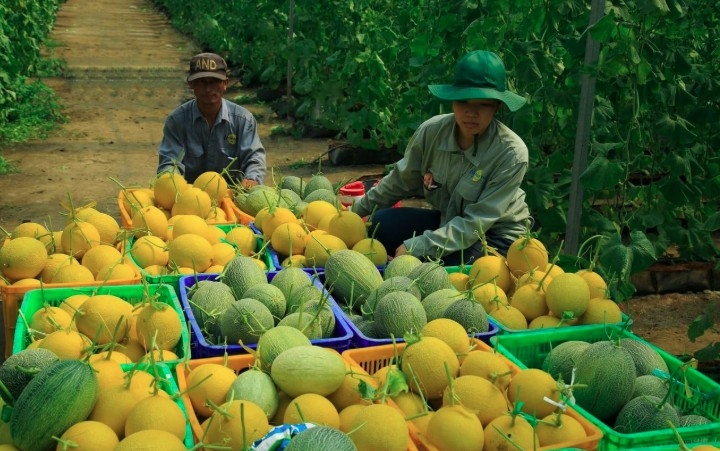New e-commerce law to open global market access for Vietnamese businesses
VOV.VN - The draft Law on E-Commerce is set to establish a new legal foundation for boosting cross-border e-commerce exports and enabling Vietnamese enterprises to access the global market.

The draft Law on E-Commerce, expected to be submitted to the National Assembly for approval and take effect in 2026, is set to provide a modern legal foundation for digital exports and help Vietnamese businesses reach global markets.
One of its key priorities is facilitating the export of goods and services through both domestic and cross-border e-commerce platforms.
The draft law classifies types of e-commerce platforms, including direct sales platforms, intermediaries, social media platforms, and multi-service integrators, and sets out clear requirements regarding operating conditions, legal responsibilities, data retention, content moderation, consumer protection, and tax obligations.
At a consultation held by the Ministry of Industry and Trade on June 30, 2025, representatives from businesses, international organizations, and industry associations pointed to persistent gaps in the support ecosystem for digital exports.
A representative of the US-ASEAN Business Council (USABC) noted that the draft does not clearly define policies to encourage broader participation in Vietnam’s e-commerce export ecosystem. USABC recommended introducing targeted tax incentives for international platforms that actively support Vietnamese exporters. These could include reduced or waived taxes on revenues from marketing, seller support services, and simplified administrative procedures for platforms that demonstrate practical contributions.
In addition to broad legal principles, the draft emphasizes transparency in electronic transactions. E-contracts would be granted the same legal validity as physical documents, giving businesses and consumers greater confidence in digital transactions. Detailed provisions on contract formation, including offers, confirmations, cancellations, and data retention, aim to minimize risks in international dealings.
For platforms with foreign elements, which account for most digital export traffic, the law outlines clear conditions for legal operation in Vietnam. These include having a ".vn" domain, providing a Vietnamese-language interface, or surpassing 100,000 domestic transactions per year. In such cases, foreign entities would be required to appoint a local legal representative or proxy with adequate financial and technical capacity, and would bear joint liability in case of violations.
The Vietnam E-Commerce Association (VECOM) emphasized that this is a priority area. Since the start of the year, VECOM has worked closely with the drafting committee to help shape a framework that ensures effective oversight while also enabling e-commerce to become a strategic export channel for Vietnamese businesses.

From the business side, a Shopee representative highlighted the importance of fair regulation, noting: “If domestic enterprises are subject to strict legal requirements, cross-border players should also carry equal responsibilities when engaging in Vietnam’s export market.”
Shopee proposed adding a clause to Article 31 requiring large-scale cross-border platforms to undergo cybersecurity assessments and obtain approval from the Ministry of Public Security, in line with rules already applied to foreign-invested domestic platforms. Vietnamese businesses also suggested limiting each cross-border platform to a single authorized representative in Vietnam, to ensure accountability and prevent rotation of proxies to avoid legal responsibilities.
Support measures to bolster e-commerce exports
Beyond the legal framework, the draft dedicates an entire chapter to market development, identifying cross-border e-commerce exports as a strategic pillar. Under this provision, the Ministry of Industry and Trade will be tasked with formulating a National E-Commerce Development Strategy for approval by the Prime Minister. The strategy will include targeted programs, priority projects, and associated financial mechanisms.
One notable initiative is the establishment of pilot cross-border e-commerce zones. These zones will benefit from special policies on customs clearance, bonded warehousing, logistics, and corporate income tax, particularly targeting micro, small, and medium-sized enterprises that often struggle to access traditional export channels.
The E-Commerce Development Fund, a non-budgetary fund under the Ministry of Industry and Trade, will serve as the main resource to support businesses in digital transformation. It will help them pilot new business models (via sandbox mechanisms), upgrade digital platforms, develop human resources, and boost exports through e-commerce.
On infrastructure, the draft outlines a centralized platform for e-commerce management, integrated with national data systems. This platform will support market tracking, fraud detection, and timely access to business information. It will also function as a public portal for reporting violations, handling complaints, and publishing market statistics.
To build trust in cross-border transactions, the draft introduces secure payment mechanisms to protect consumers and ensure reliability in digital exports. Platform operators will be encouraged to implement quality assurance systems and may be required to compensate buyers in case of disputes.
Regarding financial supervision, the Ministry of Finance has pledged to coordinate with the Ministry of Industry and Trade to develop transparent and efficient mechanisms. Notably, the Ministry is studying the potential rollout of a cross-border e-commerce payment gateway to improve transaction traceability, reduce tax losses, and ensure transparency in international transactions.




